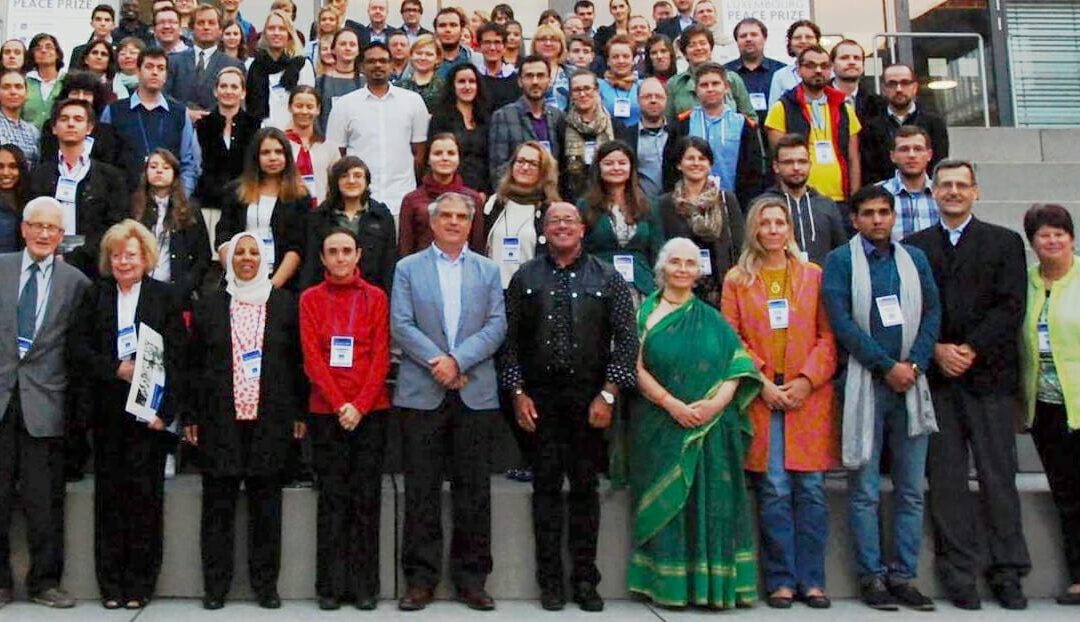
Oct 19, 2015 | Non categorizzato
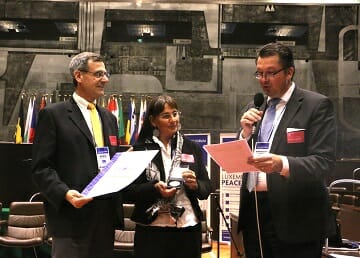 The prize, given by the Schengen Peace Foundation was assigned to New Humanity, an NGO that represents the Focolare Movement among international organisations, during the Youth World Peace Forum that both organisations had collaborated in organising at Rowad American College in Cairo last May, as part of the Living Peace Project that involves more than 80 thousand students and 200 schools around the world in planning and carrying out peace education projects. “After being so struck by the extraordinary volunteer work of so many young members of the Focolare Movement,” writes Dominicus Rhode, president of the forum and of the foundation, “we immediately decided to award the 2015 Luxembourg Peace Prize to New Humanity.” In accepting the award, Marco Desalvo, president of the organisation, remarked: “We are especially pleased because this was the reason for which New Humanity was begun, to contribute to the creation of the unity of the human family, respecting everyone’s identity, and and promoting the spirit of universal brotherhood. This is an award for which we are grateful, but mostly an encouragement to continue on with our work.” While describing the activities of New Humanity in the world’s ‘hot spots’ like Syria and the Middle East, but also in Europe, Desalvo, vice president Cecilia Landucci and Anita Martinez also announced the beginning of a collection of signatures for a petition that would be taken to international leaders and to the United Nations: “In this appeal,” he explained, “we ask all governments to fight extreme poverty with renewed commitment to reducing inequality; to continue in the effort to guarantee a basic education for everyone; to reduce public spending for arms so as to free up resources for development; to take a second look at the current systems of government in terms of a greater democratic control of economic and monetary politics; and to adopt new systems and applications of the laws to fight organised crime.”
The prize, given by the Schengen Peace Foundation was assigned to New Humanity, an NGO that represents the Focolare Movement among international organisations, during the Youth World Peace Forum that both organisations had collaborated in organising at Rowad American College in Cairo last May, as part of the Living Peace Project that involves more than 80 thousand students and 200 schools around the world in planning and carrying out peace education projects. “After being so struck by the extraordinary volunteer work of so many young members of the Focolare Movement,” writes Dominicus Rhode, president of the forum and of the foundation, “we immediately decided to award the 2015 Luxembourg Peace Prize to New Humanity.” In accepting the award, Marco Desalvo, president of the organisation, remarked: “We are especially pleased because this was the reason for which New Humanity was begun, to contribute to the creation of the unity of the human family, respecting everyone’s identity, and and promoting the spirit of universal brotherhood. This is an award for which we are grateful, but mostly an encouragement to continue on with our work.” While describing the activities of New Humanity in the world’s ‘hot spots’ like Syria and the Middle East, but also in Europe, Desalvo, vice president Cecilia Landucci and Anita Martinez also announced the beginning of a collection of signatures for a petition that would be taken to international leaders and to the United Nations: “In this appeal,” he explained, “we ask all governments to fight extreme poverty with renewed commitment to reducing inequality; to continue in the effort to guarantee a basic education for everyone; to reduce public spending for arms so as to free up resources for development; to take a second look at the current systems of government in terms of a greater democratic control of economic and monetary politics; and to adopt new systems and applications of the laws to fight organised crime.” 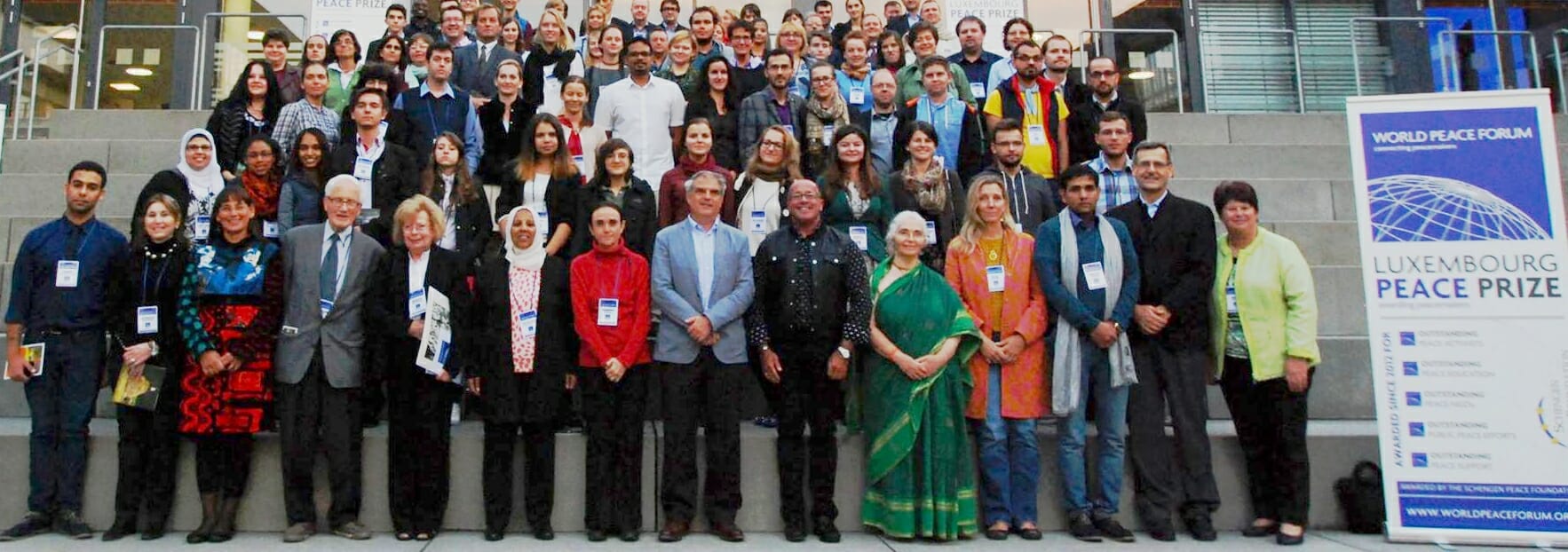 The Youth World Youth Peace Forum, within which the prize was awarded, is a global platform for improving the exchange of best practices amongst associations and individuals active in the area of peace, and joins a large number of professionals from all backgrounds from around the world, who share their hope. Several presentations highlighted ways of coming up with peaceful alternatives to conflicts which have always proven to be more efficacious, at all levels and from every standpoint – rather than war. Testimonies were also given by Syrian refugees and people from other lands, as well as by those who welcomed them in, and of others who are currently giving medical, artistic, and spiritual contributions to peace. The next Forum will be held in Florianopolis, Brazil, in September 2016. Preparations are already underway, but the end goal of all the work involves an ongoing daily commitment and involvement, as was expressed in many of the impressions and testimonies that were shared. One Syrian woman, for example, was asked what she would say to her Focolare friends who stayed behind in Aleppo, Damascus and other places in Syria. She answered: “Life is precious. If they are still in Syria, it is because they have a duty, and a message to bring. Those who cross and leave Syria must continue the work, with the same spirit of the people who could not leave the country. I continually pray to God that He will stop the war and save us from this tragedy, so that all can live in peace.”
The Youth World Youth Peace Forum, within which the prize was awarded, is a global platform for improving the exchange of best practices amongst associations and individuals active in the area of peace, and joins a large number of professionals from all backgrounds from around the world, who share their hope. Several presentations highlighted ways of coming up with peaceful alternatives to conflicts which have always proven to be more efficacious, at all levels and from every standpoint – rather than war. Testimonies were also given by Syrian refugees and people from other lands, as well as by those who welcomed them in, and of others who are currently giving medical, artistic, and spiritual contributions to peace. The next Forum will be held in Florianopolis, Brazil, in September 2016. Preparations are already underway, but the end goal of all the work involves an ongoing daily commitment and involvement, as was expressed in many of the impressions and testimonies that were shared. One Syrian woman, for example, was asked what she would say to her Focolare friends who stayed behind in Aleppo, Damascus and other places in Syria. She answered: “Life is precious. If they are still in Syria, it is because they have a duty, and a message to bring. Those who cross and leave Syria must continue the work, with the same spirit of the people who could not leave the country. I continually pray to God that He will stop the war and save us from this tragedy, so that all can live in peace.”
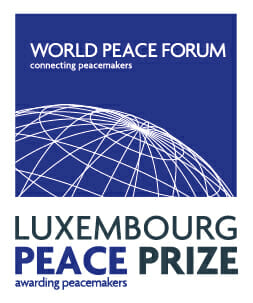
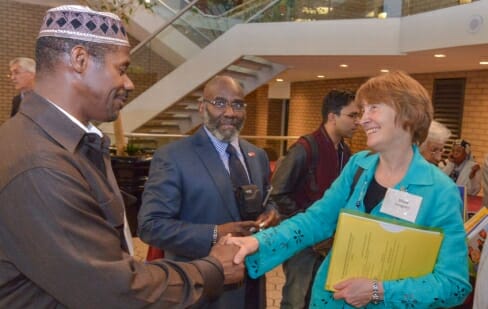
Oct 18, 2015 | Non categorizzato
 “Inculturation of faith is an intrinsic aspect of Christianity. This regards the difficult and complex processes that need time, and in this process the local people themselves are particularly important. By living the Gospel authentically, they who are already deeply rooted in their own cultures will draw forth those adaptations which they will then share with the others, through the customs, artistic expressions and mindsets of their own people. I am totally convinced that the important thing is God himself. This obviously does not mean that one can remain inactive or indifferent. Also we are gathering for example, the African proverbs or those of other peoples, and our publishing house has published books on the great religions. Chiara Lubich established a school for inculturation in Africa , after which she launched another one in Latin America. But whoever thinks that it would suffice to study the various cultures in order to make relate with the Gospel teachings, would be going down the wrong path. We have to bring God. He is the one open and fully ‘involved’ in what He himself created and He will be the one to achieve inculturation. Of course, there are many forms of inculturation and many attempts that should be encouraged and blessed. However, only God can achieve real inculturation. The greatest contribution we can give is love. If each one gives of himself, foregoing one’s own self in the other, and accepting the other in oneself, then the personality of each one will flourish at best and complete the personality of each one. The same would occur among peoples: if each people is able to “lose” its culture out of love, and open out to God in the other, the best of each culture would be “saved” and each would emerge and be enriched not only in the spiritual but also the humane, cultural, and ethnic aspects. Initially, the journey will be slow, but once the road has been paved, it will accelerate and bring enormous results.”
“Inculturation of faith is an intrinsic aspect of Christianity. This regards the difficult and complex processes that need time, and in this process the local people themselves are particularly important. By living the Gospel authentically, they who are already deeply rooted in their own cultures will draw forth those adaptations which they will then share with the others, through the customs, artistic expressions and mindsets of their own people. I am totally convinced that the important thing is God himself. This obviously does not mean that one can remain inactive or indifferent. Also we are gathering for example, the African proverbs or those of other peoples, and our publishing house has published books on the great religions. Chiara Lubich established a school for inculturation in Africa , after which she launched another one in Latin America. But whoever thinks that it would suffice to study the various cultures in order to make relate with the Gospel teachings, would be going down the wrong path. We have to bring God. He is the one open and fully ‘involved’ in what He himself created and He will be the one to achieve inculturation. Of course, there are many forms of inculturation and many attempts that should be encouraged and blessed. However, only God can achieve real inculturation. The greatest contribution we can give is love. If each one gives of himself, foregoing one’s own self in the other, and accepting the other in oneself, then the personality of each one will flourish at best and complete the personality of each one. The same would occur among peoples: if each people is able to “lose” its culture out of love, and open out to God in the other, the best of each culture would be “saved” and each would emerge and be enriched not only in the spiritual but also the humane, cultural, and ethnic aspects. Initially, the journey will be slow, but once the road has been paved, it will accelerate and bring enormous results.”
Pasquale Foresi
Excerpt from:Pasquale Foresi,Colloqui, New City Press 2009, pp.133-136. Collection of conversations with members of the Focolare Movement dated 1990/98
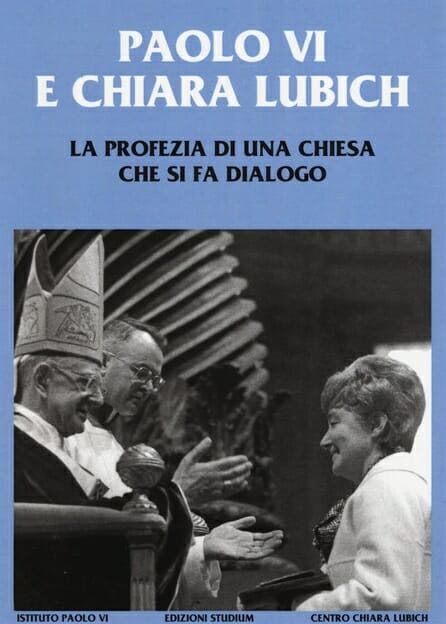
Oct 17, 2015 | Non categorizzato
 «Along the years, there have been studies and in-depth reflections on the Foundress of the Focolare Movement and Paul VI, the “helmsman of Vatican II.” But the time was not ripe for the deepening of the providential weft of relationships established between Giovanni Battista Montini and Chiara Lubich traced precisely to that period. A Pope and a lay woman: what could they have had in common? History never fails to surprise us, and the works carried out by the Paolo VI Institute and the Chiara Lubich Centre resulted in the two study days of 7/8 November 2014, centered on Paul VI, Chiara Lubich and the prophecy of a Church that impersonates dialogue. All these activities have contributed to this long-awaited publication. The book, published in July 2015, traces those events that had revealed under a historical, social, ecclesial, ecumenical and theological profile, the relationship that began in 1952 between Chiara Lubich and Montini, then the special deputy of the Secretary of State, and which continued up to the death of Paul VI in 1978. The path highlighted important moments for both the Church and the Focolare Movement, with the charismatic drive which distinguished it from the very beginning when it made its first steps in the city of Trent. As seen in the studies of the 1950s, the ecclesiastical authorities nurtured strong doubts with regard to the novelty the Movement represented, and the overcoming of this stance towards the start of the 1960s with the first approvals. At this stage, Paul VI played a fundamental role through his personal commitment in the progressive, juridical and institutional configuration of the Movement. Still quite an unknown but a highly interesting topic, it related to the presence of the Focolare in the Eastern European countries from the start of the 1960s, at the height of the Cold War, along with the intensification of contacts in the ecumenical field that came about in the same period. This account is extensively documented by an intense exchange of letters between Chiara and Paul VI, and of what Lubich wrote in her diary after the audiences with Pope Montini. The events also highlighted, alongside these two figures, the role of Igino Giordani. He was a personal friend of Paul VI who, when still a young bishop in Rome, used to frequent his home. In those times Giordani was the Vatican librarian, and future member of the Constituent assembly and Cofounder of the Focolare Movement with Chiara Lubich. Maria Voce, President of the Focolare, stressed that «there is a profound consonance which particularly reveals Pope Paul’s extreme sensitivity and capacity to see in the charism God endowed to Chiara Lubich, the work of the Holy Spirit at the crucial moment of the celebration of the Second Vatican Council that opened out to dialogue beyond frontiers. Upon meeting Chiara, he listened, appreciated, and encouraged. In 1964, struck by the ecumenical feature of the Movement, he exhorted: ”In the same way as you have started a dialogue with the non-Catholic Christians, do the same also with those who do not profess a faith.”» «This was underlined by Don Angelo Maffeis, president of the Paul VI Institute: “the beginnings of this story traces back to long before the Second Vatican Council and deserves to be reconstructed so as to highlight the background of personal contacts and ecclesial experiences that gradually led to the full development of the orientations set by Paul VI in the course of his pontificate.» The other works by Andrea Riccardi, Alberto Monticone, Lucia Abignente, Paolo Siniscalco, Joan Patricia Back, Alberto Lo Presti, Adriana Cosseddu and Piero Coda – have focused under various aspects, «the grandeur of the prophecy of a Church that became the personification of dialogue.» Two charisms met, recognised one another, and worked together to make the Church a “house of communion,” which sets itself in dialogue with the world. The volume on Paul VI and Chiara Lubich, the prophecy of a Church that personifies dialogue, was curated by Paolo Siniscalco and Xenio Toscani, and edited by ‘Studium.’» Caterina Ruggiu
«Along the years, there have been studies and in-depth reflections on the Foundress of the Focolare Movement and Paul VI, the “helmsman of Vatican II.” But the time was not ripe for the deepening of the providential weft of relationships established between Giovanni Battista Montini and Chiara Lubich traced precisely to that period. A Pope and a lay woman: what could they have had in common? History never fails to surprise us, and the works carried out by the Paolo VI Institute and the Chiara Lubich Centre resulted in the two study days of 7/8 November 2014, centered on Paul VI, Chiara Lubich and the prophecy of a Church that impersonates dialogue. All these activities have contributed to this long-awaited publication. The book, published in July 2015, traces those events that had revealed under a historical, social, ecclesial, ecumenical and theological profile, the relationship that began in 1952 between Chiara Lubich and Montini, then the special deputy of the Secretary of State, and which continued up to the death of Paul VI in 1978. The path highlighted important moments for both the Church and the Focolare Movement, with the charismatic drive which distinguished it from the very beginning when it made its first steps in the city of Trent. As seen in the studies of the 1950s, the ecclesiastical authorities nurtured strong doubts with regard to the novelty the Movement represented, and the overcoming of this stance towards the start of the 1960s with the first approvals. At this stage, Paul VI played a fundamental role through his personal commitment in the progressive, juridical and institutional configuration of the Movement. Still quite an unknown but a highly interesting topic, it related to the presence of the Focolare in the Eastern European countries from the start of the 1960s, at the height of the Cold War, along with the intensification of contacts in the ecumenical field that came about in the same period. This account is extensively documented by an intense exchange of letters between Chiara and Paul VI, and of what Lubich wrote in her diary after the audiences with Pope Montini. The events also highlighted, alongside these two figures, the role of Igino Giordani. He was a personal friend of Paul VI who, when still a young bishop in Rome, used to frequent his home. In those times Giordani was the Vatican librarian, and future member of the Constituent assembly and Cofounder of the Focolare Movement with Chiara Lubich. Maria Voce, President of the Focolare, stressed that «there is a profound consonance which particularly reveals Pope Paul’s extreme sensitivity and capacity to see in the charism God endowed to Chiara Lubich, the work of the Holy Spirit at the crucial moment of the celebration of the Second Vatican Council that opened out to dialogue beyond frontiers. Upon meeting Chiara, he listened, appreciated, and encouraged. In 1964, struck by the ecumenical feature of the Movement, he exhorted: ”In the same way as you have started a dialogue with the non-Catholic Christians, do the same also with those who do not profess a faith.”» «This was underlined by Don Angelo Maffeis, president of the Paul VI Institute: “the beginnings of this story traces back to long before the Second Vatican Council and deserves to be reconstructed so as to highlight the background of personal contacts and ecclesial experiences that gradually led to the full development of the orientations set by Paul VI in the course of his pontificate.» The other works by Andrea Riccardi, Alberto Monticone, Lucia Abignente, Paolo Siniscalco, Joan Patricia Back, Alberto Lo Presti, Adriana Cosseddu and Piero Coda – have focused under various aspects, «the grandeur of the prophecy of a Church that became the personification of dialogue.» Two charisms met, recognised one another, and worked together to make the Church a “house of communion,” which sets itself in dialogue with the world. The volume on Paul VI and Chiara Lubich, the prophecy of a Church that personifies dialogue, was curated by Paolo Siniscalco and Xenio Toscani, and edited by ‘Studium.’» Caterina Ruggiu
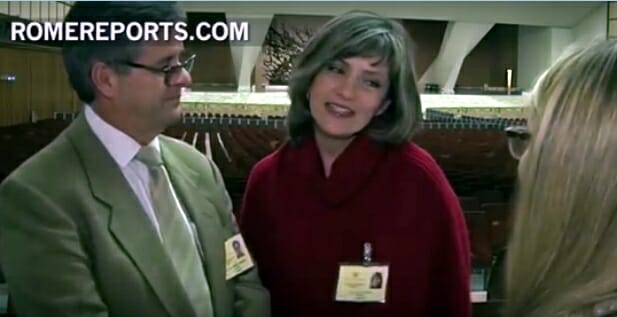
Oct 16, 2015 | Non categorizzato
 They have been married for 23 years and have two teenage sons. Raised in Catholic families, they met in the Focolare Movement to which they still belong. “We had worked in the past with a group of other young people in a marginalised quarter on the periphery of Bogota,” they recounted in their testimony at the Synod assembly. “We played with the children, taught the adults how to read, and offered free medical and dental assistance. They were talking about the Los Chircales quarter where the Centro Sociale Unidad is headquartered: “Obstacles were not lacking,” the Colombian couple who spoke at the Synod the family, said, “beginning from our concern for our personal well-being, and the fear of going into those rundown neighbourhoods and slums. But the desire to serve those brothers and sisters was more powerful than our fragility.”
They have been married for 23 years and have two teenage sons. Raised in Catholic families, they met in the Focolare Movement to which they still belong. “We had worked in the past with a group of other young people in a marginalised quarter on the periphery of Bogota,” they recounted in their testimony at the Synod assembly. “We played with the children, taught the adults how to read, and offered free medical and dental assistance. They were talking about the Los Chircales quarter where the Centro Sociale Unidad is headquartered: “Obstacles were not lacking,” the Colombian couple who spoke at the Synod the family, said, “beginning from our concern for our personal well-being, and the fear of going into those rundown neighbourhoods and slums. But the desire to serve those brothers and sisters was more powerful than our fragility.”  “We married and the grace of the sacrament soon began to manifest itself.” They are very different from one another: Luis, “the calm type”, Maria Angélica “a volcano”. “We knew that human love easily vanishes. The years go by and the initial enchantment diminishes. For this reason it was important for us to bulk up on God’s love, which taught us to love in the small things of everyday life.” Luis admitted: “For me that means not waiting to be waited on, but rather to help out washing the dishes, or to listen more attentively when she wants to tell me something. On her part, M. Angélica watches the Formula 1 with me..” By nourishing ourselves on the Eucharist, approaching the sacrament of Confession and remaining in this relationship of mutual love, we experience that Jesus becomes present in our midst, and then we have the light to raise our sons, and the strength to face the inevitable difficulties that come our way.” “A short time ago we had a rather strong conversation and the unity between us was shattered. That night, we went to bed without apologising to each other” (one of the three things that Pope Francis says should never be done in the life of a couple): “I telephoned Lucho,” M. Angélica recounts, “and told him I was sorry for having answered him so awfully. Then it turned into an opportunity to begin again loving every time we fail.” Together with bishops and priests from several cities in Colombia, and with other families and young people, they organized a series of visits to several poor communities; “The idea was to share our experiences and offer some formation as a family. Some of the couples confided their desire to receive the sacrament of matrimony.”
“We married and the grace of the sacrament soon began to manifest itself.” They are very different from one another: Luis, “the calm type”, Maria Angélica “a volcano”. “We knew that human love easily vanishes. The years go by and the initial enchantment diminishes. For this reason it was important for us to bulk up on God’s love, which taught us to love in the small things of everyday life.” Luis admitted: “For me that means not waiting to be waited on, but rather to help out washing the dishes, or to listen more attentively when she wants to tell me something. On her part, M. Angélica watches the Formula 1 with me..” By nourishing ourselves on the Eucharist, approaching the sacrament of Confession and remaining in this relationship of mutual love, we experience that Jesus becomes present in our midst, and then we have the light to raise our sons, and the strength to face the inevitable difficulties that come our way.” “A short time ago we had a rather strong conversation and the unity between us was shattered. That night, we went to bed without apologising to each other” (one of the three things that Pope Francis says should never be done in the life of a couple): “I telephoned Lucho,” M. Angélica recounts, “and told him I was sorry for having answered him so awfully. Then it turned into an opportunity to begin again loving every time we fail.” Together with bishops and priests from several cities in Colombia, and with other families and young people, they organized a series of visits to several poor communities; “The idea was to share our experiences and offer some formation as a family. Some of the couples confided their desire to receive the sacrament of matrimony.”

Interview with Rome Reports
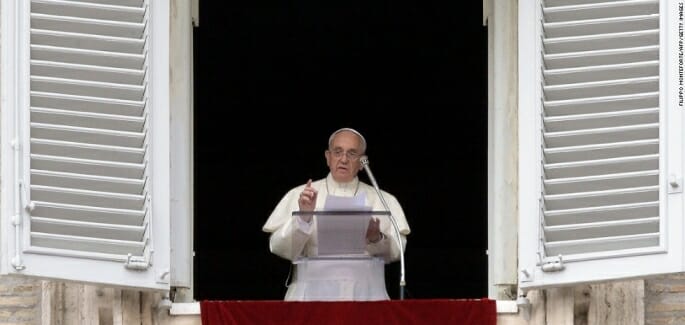
Oct 15, 2015 | Focolare Worldwide
 “We are painfully wounded and follow with deep concern what is taking place in Syria, Iraq, Jerusalem and the West Bank where we are witnessing an escalation in the violence that involves innocent civilians and continues to increase a humanitarian crisis of enormous proportions. War only brings destruction and multiplies the sufferings of entire populations,” stated Pope Francis during the works of the Synod on the Family. “Thank you for your prayers, for this situation we are going through in the Holy Land,” writes the local Focolare Community there. “The hatred leads to violence, and the violence to more hatred . . . a vicious circle is spinning out of control. You can see the situation here transmitted on the media every day. All of us, from both sides, like many other people are deeply saddened and feel helpless in front of this evil. We try to move carefully; we pray more; we try to sow love with a smile or an act of kindness. . .” “We continue to pray and to build peace,” they conclude, “hoping that the longing for reconciliation prevails.”
“We are painfully wounded and follow with deep concern what is taking place in Syria, Iraq, Jerusalem and the West Bank where we are witnessing an escalation in the violence that involves innocent civilians and continues to increase a humanitarian crisis of enormous proportions. War only brings destruction and multiplies the sufferings of entire populations,” stated Pope Francis during the works of the Synod on the Family. “Thank you for your prayers, for this situation we are going through in the Holy Land,” writes the local Focolare Community there. “The hatred leads to violence, and the violence to more hatred . . . a vicious circle is spinning out of control. You can see the situation here transmitted on the media every day. All of us, from both sides, like many other people are deeply saddened and feel helpless in front of this evil. We try to move carefully; we pray more; we try to sow love with a smile or an act of kindness. . .” “We continue to pray and to build peace,” they conclude, “hoping that the longing for reconciliation prevails.”
Oct 15, 2015 | Non categorizzato
https://www.youtube.com/watch?v=om7WN06PMiU
Oct 14, 2015 | Non categorizzato
In 5 September the Gen Rosso International Performing Arts Group started its tour with the Fazenda da Esperança which is celebrating in 6 different cities the definitive approval of the work of Frei Hans, Nelson, Lucy and Iraçi called Familia da Esperança. First stopover: Palmas, at the geographic centre of Brazil, a recently built city and capital of the new state of Tocantins. 9 workshops (stage scenery, theatre, music, hip-hop gang, hip hop combination, Festao, strong moves, percussions and broadway) and 2 concerts with a total of 2,300 people. Also the National network TV Globo, the Director of the TV Anhaguera channel, the Director of the local newspaper, the Prefect, Archbishop and 2 bishops will be present. The second stopover from 14 to 20 September: Caxias in the state of Maranão which is a state with prevalently farming activities. Third stopover in Manaus (21-25 September) and Garanhuns in the State of Pernambuco. In October the group will be in Casca in the State of Rio Grande do Sul, up the 17th after which, in Guaratinguetá in the state of San Paolo and Guarapuava in the State of Paraná. TOUR Programme in Brazil
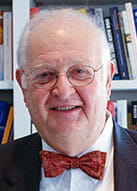
Oct 14, 2015 | Non categorizzato
 The 2015 Nobel Prize awarded to Angus Deaton for his studies on economic development, wellbeing, inequality, consumption choices and the determination of poverty is a very important sign: after years of the financial crisis, Stockholm and its consultants continued to award economists who had studied and promoted economy and finance that contributed to generating the crisis. In this most important seat of contemporary science and social sciences, the awarding of the Nobel Prize to Deaton has returned to promoting the really all-around social scientists of the world, and advocates of a political or civil science which is at the origin of modern economy. Stockholm’s policy has been somewhat bizarre over the last years: from 2010 to 2013, while capitalism was running the risk of an implosion under an unprecedented financial crisis, the Nobel Prizes for Economy were awarded to some economists who were among the major advocates of the economic and financial paradigm that was revealing all its tragic limits. It was almost as if during a summer with the highest number of arson crimes ever, the award was to go to those who studied sophisticated fire-lighting techniques. This is why the Nobel Prize this time, and in some way that of last year assigned to the Frenchman, Jean Tirole, could be a sign of a reverse trend since the award to Deaton closely resembles the awards given to Amartya Sen, Joseph E. Stiglitz, Elinor Ostrom and more recently to Eugene Fama and Lloyd Stowell Shapley. We must not forget that the financial and economic crisis we experienced and are still undergoing, is not independent from the economic theories of the last decade, since unlike the astrophysicists whose theories do not modify the orbit of the planets, economists and their theories strongly impact on economic choices. Over the last years the best of the world’s economic departments were increasingly filled with more mathematicians with increasingly scarce humanistic backgrounds, and experts of hyper-specialised models most of whom were no longer capable of having an overall view of the economic system and thus associate their models with the socio-economic reality. Besides the award to Deaton following that given to Tirole, this could indicate a return to a more European economic theory, which pays greater attention to the social dimension of the profession, and more sensitivity to the themes of collective wellbeing and not only individual profits and turnovers. This probable dawning will, however, reach its peak if the next Nobel prizes highlight more philosopher economists and less mathematician economists, as once described by the British economist, Robert Sugden, in 1991: “The economist today needs to return to being more of a philosopher and less of a mathematician.” It was an invitation which at that time was hardly noticed by professionals of the sector, but we may still be on time to do so. Angus Deaton is furthermore, an economist who not only writes mathematic articles but also books. We recommend his latest work, “The Great Escape: Health, Wealth, and the Origins of Inequality,” in which the new Nobel laureate and authentic social scientist and rightful heir of this co-citizen, Adam Smith (philosopher and economist), asked himself whether humanity will, in the future, enjoy a period of progress without inequality, a fundamental issue today when we are paying the price for progress with growing inequality in the world and a decrease in happiness. Economics could return to being a moral, society-friendly science if it will start again to ask itself questions which were too rapidly abandoned to respond to easier queries, less useful to human progress. Luigino Bruni
The 2015 Nobel Prize awarded to Angus Deaton for his studies on economic development, wellbeing, inequality, consumption choices and the determination of poverty is a very important sign: after years of the financial crisis, Stockholm and its consultants continued to award economists who had studied and promoted economy and finance that contributed to generating the crisis. In this most important seat of contemporary science and social sciences, the awarding of the Nobel Prize to Deaton has returned to promoting the really all-around social scientists of the world, and advocates of a political or civil science which is at the origin of modern economy. Stockholm’s policy has been somewhat bizarre over the last years: from 2010 to 2013, while capitalism was running the risk of an implosion under an unprecedented financial crisis, the Nobel Prizes for Economy were awarded to some economists who were among the major advocates of the economic and financial paradigm that was revealing all its tragic limits. It was almost as if during a summer with the highest number of arson crimes ever, the award was to go to those who studied sophisticated fire-lighting techniques. This is why the Nobel Prize this time, and in some way that of last year assigned to the Frenchman, Jean Tirole, could be a sign of a reverse trend since the award to Deaton closely resembles the awards given to Amartya Sen, Joseph E. Stiglitz, Elinor Ostrom and more recently to Eugene Fama and Lloyd Stowell Shapley. We must not forget that the financial and economic crisis we experienced and are still undergoing, is not independent from the economic theories of the last decade, since unlike the astrophysicists whose theories do not modify the orbit of the planets, economists and their theories strongly impact on economic choices. Over the last years the best of the world’s economic departments were increasingly filled with more mathematicians with increasingly scarce humanistic backgrounds, and experts of hyper-specialised models most of whom were no longer capable of having an overall view of the economic system and thus associate their models with the socio-economic reality. Besides the award to Deaton following that given to Tirole, this could indicate a return to a more European economic theory, which pays greater attention to the social dimension of the profession, and more sensitivity to the themes of collective wellbeing and not only individual profits and turnovers. This probable dawning will, however, reach its peak if the next Nobel prizes highlight more philosopher economists and less mathematician economists, as once described by the British economist, Robert Sugden, in 1991: “The economist today needs to return to being more of a philosopher and less of a mathematician.” It was an invitation which at that time was hardly noticed by professionals of the sector, but we may still be on time to do so. Angus Deaton is furthermore, an economist who not only writes mathematic articles but also books. We recommend his latest work, “The Great Escape: Health, Wealth, and the Origins of Inequality,” in which the new Nobel laureate and authentic social scientist and rightful heir of this co-citizen, Adam Smith (philosopher and economist), asked himself whether humanity will, in the future, enjoy a period of progress without inequality, a fundamental issue today when we are paying the price for progress with growing inequality in the world and a decrease in happiness. Economics could return to being a moral, society-friendly science if it will start again to ask itself questions which were too rapidly abandoned to respond to easier queries, less useful to human progress. Luigino Bruni
Oct 14, 2015 | Non categorizzato
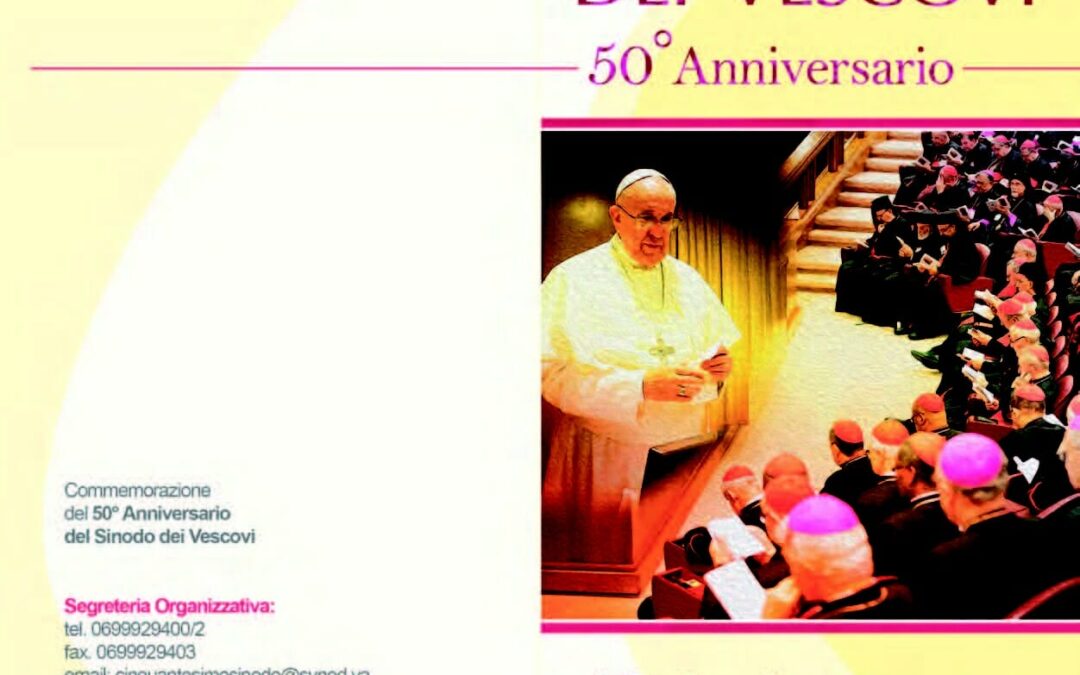
Oct 13, 2015 | Non categorizzato
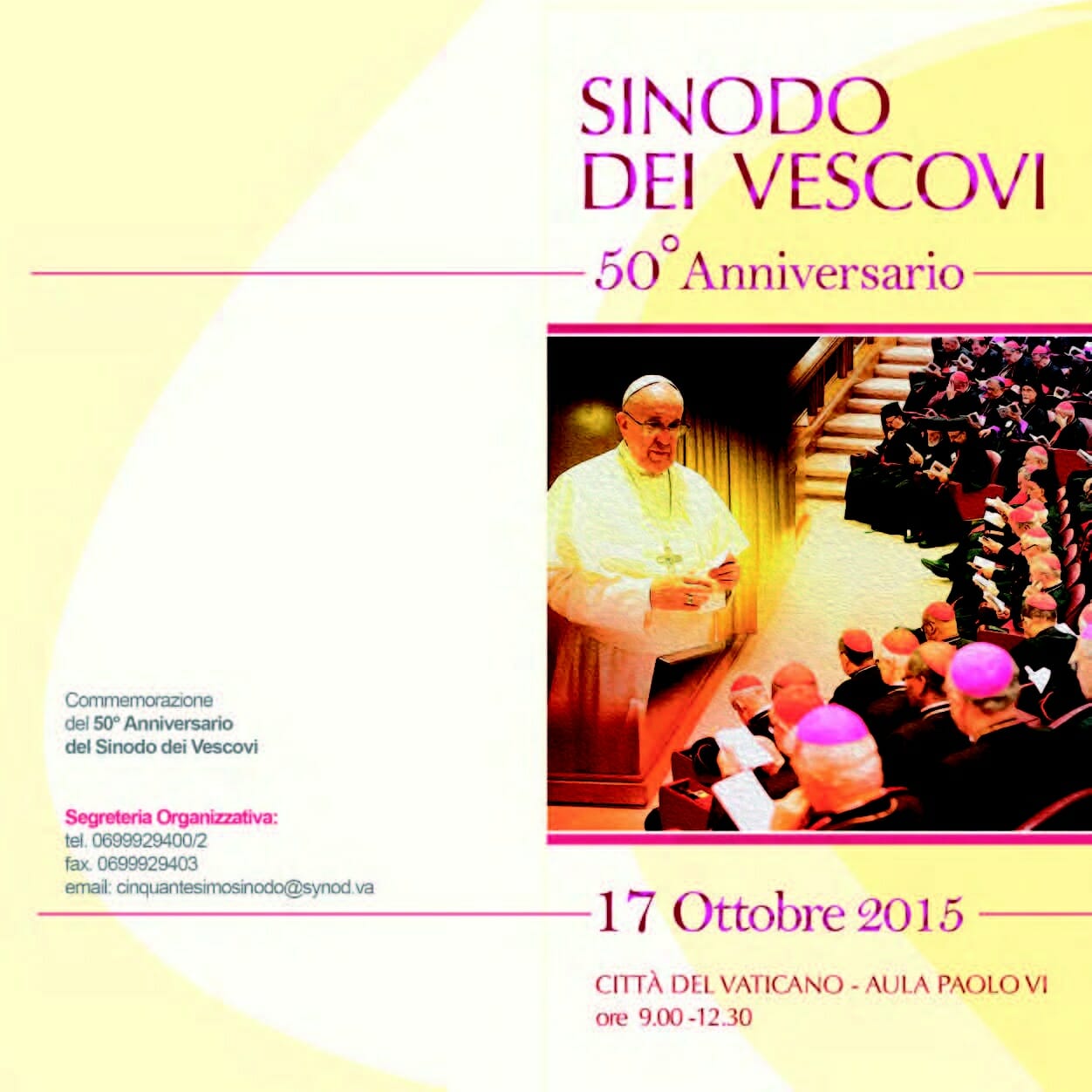 The Synod of Bishops is a permanent institution that was created by Paul VI on September 15, 1965, to keep alive the spirit of collegiality of the Second Vatican Council. This year marks the 50th anniversary of the institution, and the Catholic Church remembers it during the ordinary assembly of the Synod of Bishops, on “the vocation and mission of the family in the Church and in the contemporary world (October 5-25, 2015). On the morning of October 17, in the presence of Pope Francis, interventions will be given by Cardinal Lorenzo Baldisseri, General Secretary of the Synod of Bishops, and Cardinal Christoph Schönborn, President of the Bishops Conference of Austria. This will be followed by messages of bishops from the five continents, and the concluding address by the Holy Father. There is a large delegation from the Focolare amongst the invited guests, including Focolare president Maria Voce who described the Synod of Bishops as “one of the best fruits of the Second Vatican Council for a new sense of collegiality and deeper communion for the further building up of the Universal Church.” Synod comes from the Greek word “syn-hodos” which means “meeting” or “together”. The original meaning of the word, which is to “walk together”, expresses the essence of the Synod: a place for the bishops to encounter one another with the Pope, to share their thoughts and experiences in the common search for pastoral solutions that can be offered to the Church around the world.
The Synod of Bishops is a permanent institution that was created by Paul VI on September 15, 1965, to keep alive the spirit of collegiality of the Second Vatican Council. This year marks the 50th anniversary of the institution, and the Catholic Church remembers it during the ordinary assembly of the Synod of Bishops, on “the vocation and mission of the family in the Church and in the contemporary world (October 5-25, 2015). On the morning of October 17, in the presence of Pope Francis, interventions will be given by Cardinal Lorenzo Baldisseri, General Secretary of the Synod of Bishops, and Cardinal Christoph Schönborn, President of the Bishops Conference of Austria. This will be followed by messages of bishops from the five continents, and the concluding address by the Holy Father. There is a large delegation from the Focolare amongst the invited guests, including Focolare president Maria Voce who described the Synod of Bishops as “one of the best fruits of the Second Vatican Council for a new sense of collegiality and deeper communion for the further building up of the Universal Church.” Synod comes from the Greek word “syn-hodos” which means “meeting” or “together”. The original meaning of the word, which is to “walk together”, expresses the essence of the Synod: a place for the bishops to encounter one another with the Pope, to share their thoughts and experiences in the common search for pastoral solutions that can be offered to the Church around the world.

 The prize, given by the Schengen Peace Foundation was assigned to New Humanity, an NGO that represents the Focolare Movement among international organisations, during the Youth World Peace Forum that both organisations had collaborated in organising at Rowad American College in Cairo last May, as part of the Living Peace Project that involves more than 80 thousand students and 200 schools around the world in planning and carrying out peace education projects. “After being so struck by the extraordinary volunteer work of so many young members of the Focolare Movement,” writes Dominicus Rhode, president of the forum and of the foundation, “we immediately decided to award the 2015 Luxembourg Peace Prize to New Humanity.” In accepting the award, Marco Desalvo, president of the organisation, remarked: “We are especially pleased because this was the reason for which New Humanity was begun, to contribute to the creation of the unity of the human family, respecting everyone’s identity, and and promoting the spirit of universal brotherhood. This is an award for which we are grateful, but mostly an encouragement to continue on with our work.” While describing the activities of New Humanity in the world’s ‘hot spots’ like Syria and the Middle East, but also in Europe, Desalvo, vice president Cecilia Landucci and Anita Martinez also announced the beginning of a collection of signatures for a petition that would be taken to international leaders and to the United Nations: “In this appeal,” he explained, “we ask all governments to fight extreme poverty with renewed commitment to reducing inequality; to continue in the effort to guarantee a basic education for everyone; to reduce public spending for arms so as to free up resources for development; to take a second look at the current systems of government in terms of a greater democratic control of economic and monetary politics; and to adopt new systems and applications of the laws to fight organised crime.”
The prize, given by the Schengen Peace Foundation was assigned to New Humanity, an NGO that represents the Focolare Movement among international organisations, during the Youth World Peace Forum that both organisations had collaborated in organising at Rowad American College in Cairo last May, as part of the Living Peace Project that involves more than 80 thousand students and 200 schools around the world in planning and carrying out peace education projects. “After being so struck by the extraordinary volunteer work of so many young members of the Focolare Movement,” writes Dominicus Rhode, president of the forum and of the foundation, “we immediately decided to award the 2015 Luxembourg Peace Prize to New Humanity.” In accepting the award, Marco Desalvo, president of the organisation, remarked: “We are especially pleased because this was the reason for which New Humanity was begun, to contribute to the creation of the unity of the human family, respecting everyone’s identity, and and promoting the spirit of universal brotherhood. This is an award for which we are grateful, but mostly an encouragement to continue on with our work.” While describing the activities of New Humanity in the world’s ‘hot spots’ like Syria and the Middle East, but also in Europe, Desalvo, vice president Cecilia Landucci and Anita Martinez also announced the beginning of a collection of signatures for a petition that would be taken to international leaders and to the United Nations: “In this appeal,” he explained, “we ask all governments to fight extreme poverty with renewed commitment to reducing inequality; to continue in the effort to guarantee a basic education for everyone; to reduce public spending for arms so as to free up resources for development; to take a second look at the current systems of government in terms of a greater democratic control of economic and monetary politics; and to adopt new systems and applications of the laws to fight organised crime.”  The Youth World Youth Peace Forum, within which the prize was awarded, is a global platform for improving the exchange of best practices amongst associations and individuals active in the area of peace, and joins a large number of professionals from all backgrounds from around the world, who share their hope. Several presentations highlighted ways of coming up with peaceful alternatives to conflicts which have always proven to be more efficacious, at all levels and from every standpoint – rather than war. Testimonies were also given by Syrian refugees and people from other lands, as well as by those who welcomed them in, and of others who are currently giving medical, artistic, and spiritual contributions to peace. The next Forum will be held in Florianopolis, Brazil, in September 2016. Preparations are already underway, but the end goal of all the work involves an ongoing daily commitment and involvement, as was expressed in many of the impressions and testimonies that were shared. One Syrian woman, for example, was asked what she would say to her Focolare friends who stayed behind in Aleppo, Damascus and other places in Syria. She answered: “Life is precious. If they are still in Syria, it is because they have a duty, and a message to bring. Those who cross and leave Syria must continue the work, with the same spirit of the people who could not leave the country. I continually pray to God that He will stop the war and save us from this tragedy, so that all can live in peace.”
The Youth World Youth Peace Forum, within which the prize was awarded, is a global platform for improving the exchange of best practices amongst associations and individuals active in the area of peace, and joins a large number of professionals from all backgrounds from around the world, who share their hope. Several presentations highlighted ways of coming up with peaceful alternatives to conflicts which have always proven to be more efficacious, at all levels and from every standpoint – rather than war. Testimonies were also given by Syrian refugees and people from other lands, as well as by those who welcomed them in, and of others who are currently giving medical, artistic, and spiritual contributions to peace. The next Forum will be held in Florianopolis, Brazil, in September 2016. Preparations are already underway, but the end goal of all the work involves an ongoing daily commitment and involvement, as was expressed in many of the impressions and testimonies that were shared. One Syrian woman, for example, was asked what she would say to her Focolare friends who stayed behind in Aleppo, Damascus and other places in Syria. She answered: “Life is precious. If they are still in Syria, it is because they have a duty, and a message to bring. Those who cross and leave Syria must continue the work, with the same spirit of the people who could not leave the country. I continually pray to God that He will stop the war and save us from this tragedy, so that all can live in peace.” 









